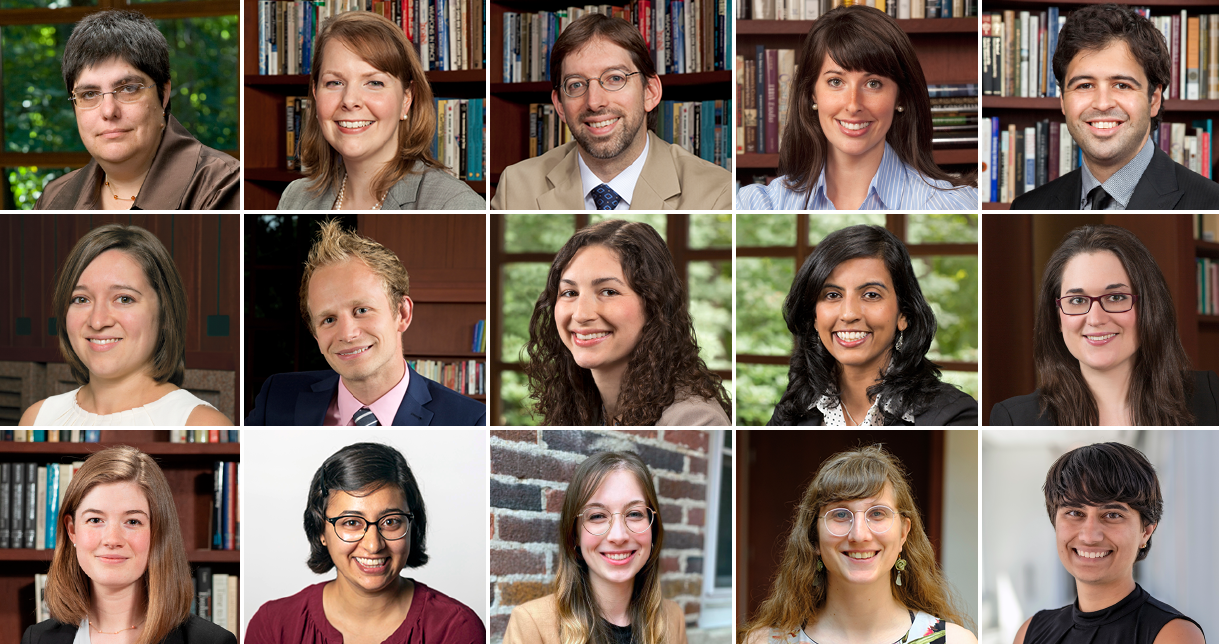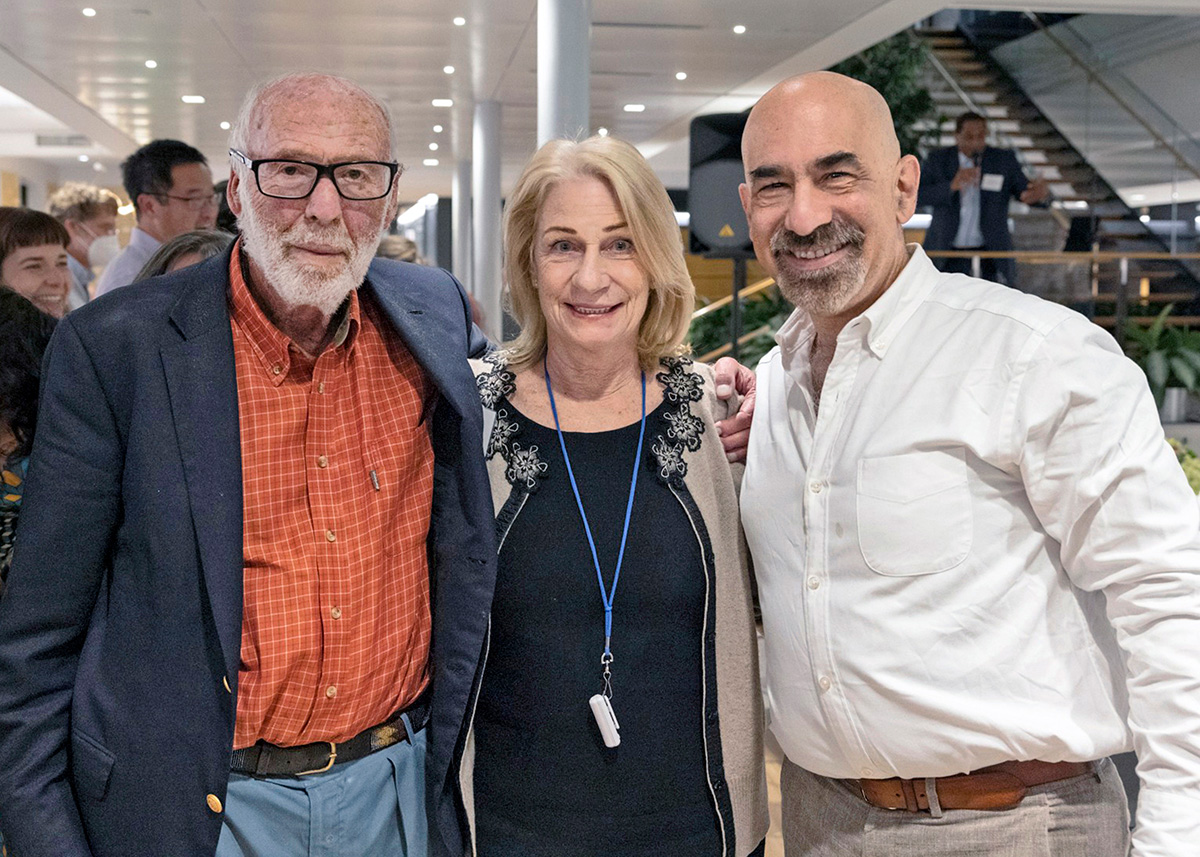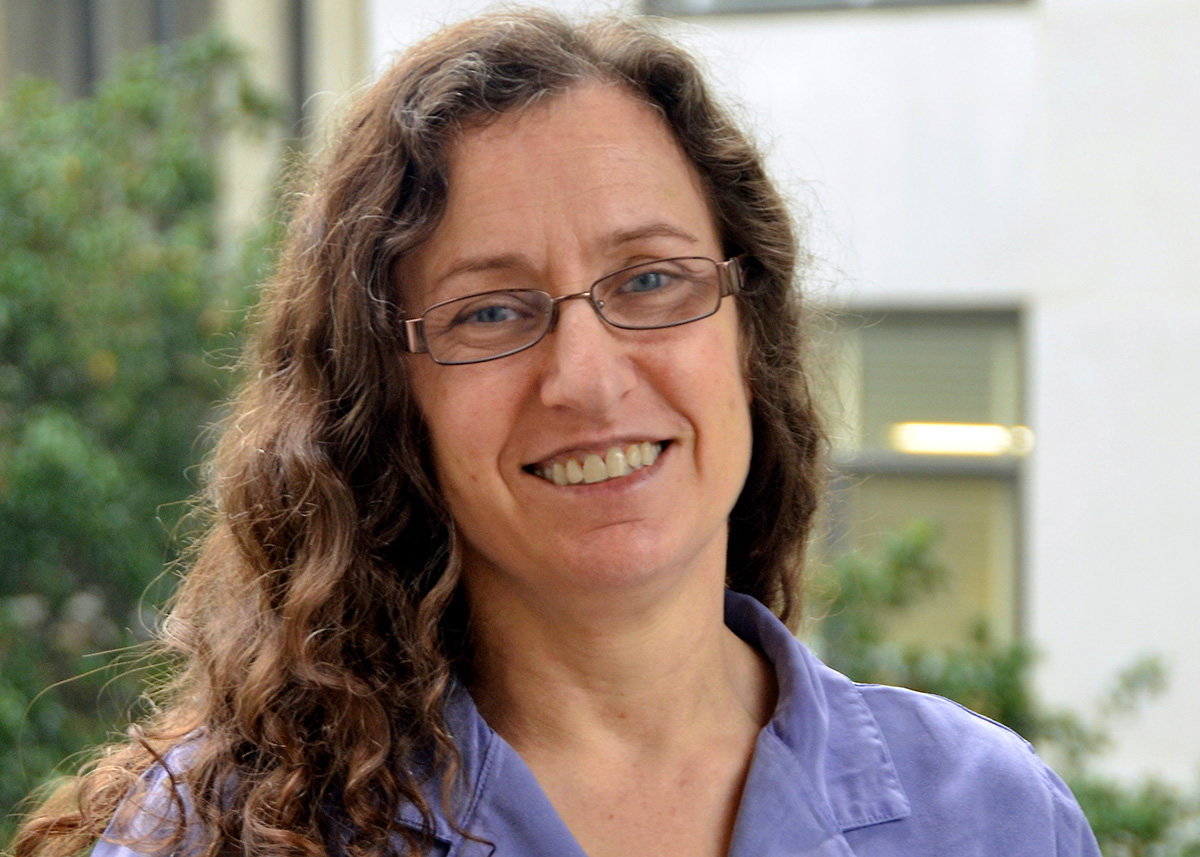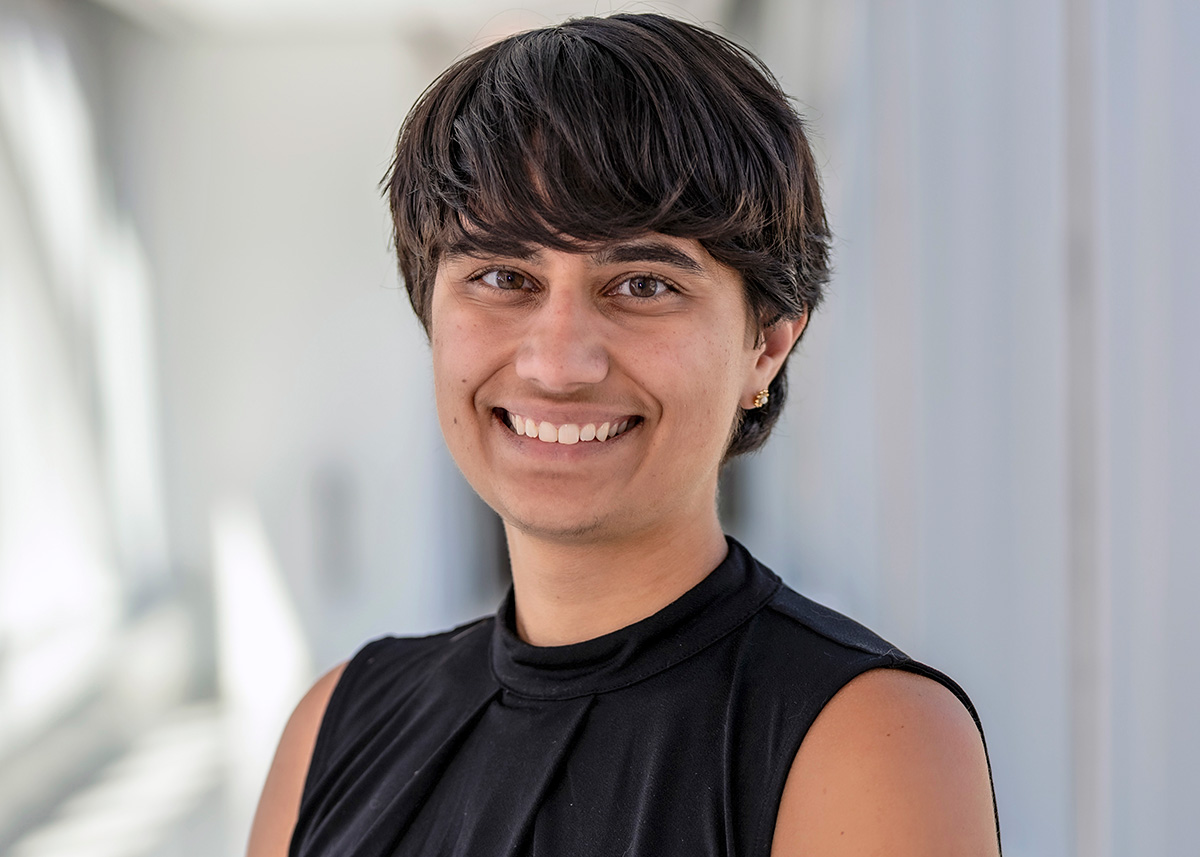By Mark Murphy, Director of Institutional Giving
The American Academy of Arts and Sciences is pleased to announce the creation of a new endowed fund to support its premier fellowship program in science-related policy. Previously named the Hellman Fellowship in Science and Technology Policy, the rebranded program will now be known as the Hellman and Simons Fellowship in Science and Technology Policy. The new name reflects the contributions of two families, the Hellman Family on the West Coast and the Simons Family on the East Coast, with strong philanthropic ties to the Academy and longstanding commitments to the critical importance of basic and academic science research in America.
Through the generosity of the Hellman and Simons families, the fellowship that bears their names is now perpetually funded and will continue to:
- support and guide early-career professionals who want to develop expertise on issues of science, engineering, and technology policy;
- increase the number of science-policy professionals who are engaged in substantive discussion of science and engineering research questions and their social implications; and
- expand the scale of Academy projects and studies focused on challenges facing scientific research and science education.
The Academy’s science policy work is uniquely interdisciplinary, bridging the humanities and social sciences with the natural and physical sciences to strengthen national understanding, belief, and trust in science and discovery. As science drives innovation and economic growth, the need for scientists to inform policy is greater than ever before. The Hellman and Simons Fellowship equips emerging leaders with the skills to effectively apply their scientific expertise across public and private sector roles.
The History of the Fellowship
In 2007, Academy member Warren Hellman and his wife Chris made a commitment of $1 million to launch the Hellman Fellowship in Science and Technology Policy at the Academy. The grant was part of a broader family philanthropic effort launched in 1995 within the University of California system that was inspired by their daughter Frances Hellman, a noted Professor of Physics and of Materials Science and Engineering, former Chair of Physics, and former Dean of the Division of Mathematical and Physical Sciences in the College of Letters and Science at UC Berkeley; former President of the American Physical Society; and member of the Academy, elected in 2013. Early in her academic research career, Frances had noted that young researchers and faculty without tenure were most in need of funding support that would allow them to think boldly about their research and take their academic careers to the next level. The Hellman family addressed this need by providing financial awards for early-stage researchers in many institutions, helping to build the confidence and credibility of the next generation of faculty research professionals.
Chris and Warren Hellman saw this grant, one of the few made outside of the University of California system, as an investment in the Academy’s capacity to support and guide early-career professionals who want to develop expertise on issues of science, engineering, and technology policy. In doing so, they hoped to increase the number of science-policy professionals who are engaged in substantive discussion of science and engineering research questions, with a broad understanding of their social implications.
The Hellman Fellowship in Science and Technology Policy became an immediate boon to the Academy’s Science, Engineering, and Technology Program team. In the years following the deaths of Warren (2011) and Chris (2017), the Hellman family made additional grants to further support their parents’ inspirational vision. When the Hellman Foundation announced its plan to spend down its assets and close the foundation’s doors by the end of 2034, a new commitment of support made $1 million available in the hopes of finding a philanthropic partner to permanently endow the Academy’s fellowship program.
When presented with the challenge of raising an additional $1 million in endowment funding the Academy’s first call was to Jim and Marilyn Simons and the Simons Foundation. Jim was an award-winning mathematician, a legend in quantitative investing, and a dedicated philanthropist. With his wife Marilyn, they gave billions of dollars to hundreds of philanthropic causes, particularly those supporting math and science research and education. The Simons Foundation supports scientists and organizations worldwide in advancing the frontiers of research in mathematics and the basic sciences. Their historic $500 million endowment gift in 2023 to Stony Brook University was the largest unrestricted donation to an institution of higher education in U.S. history.
Elected to the Academy in 2008, Jim was an enthusiastic and engaged member who believed strongly in the institution and its work. He was a greatly admired and respected advisor on the Academy’s Science, Engineering, and Technology program committee, where for many years he helped shape a body of work that included important projects such as ARISE—Advancing Research In Science and Engineering: Investing in Early-Career Scientists and High-Risk, High-Reward Research; The Public Face of Science; and Challenges for International Scientific Partnerships—all projects that benefited from the involvement of the Academy’s Hellman Fellow.
Jim sadly passed away in 2024. His wife Marilyn (elected to the Academy in 2024) and Simons Foundation President David Spergel (elected in 2012) have continued his legacy at the Academy with a matching grant of $1 million to complete the endowment for the rebranded Hellman and Simons Fellowship in Science and Technology Policy.
“One of the driving goals that Jim and I always had for the foundation was to support basic science by funding critical but underfunded work and people. This fellowship does that wonderfully, by providing early-career researchers expertise in the intersection of science and policy. Jim always understood that government and science together were only as strong as their nexus,” Marilyn Simons said.
David Spergel added, “We at the Simons Foundation are pleased to join the Hellman Foundation in supporting this important program and helping to support the development of early-career scientists who have a deep interest in policy. These scientists/policymakers will likely play an essential role in addressing some of society’s most pressing problems.”
Through the generous commitments of both the Hellman and Simons families, this uniquely placed policy-oriented fellowship program will continue to serve the Academy and future generations of young science policy professionals for years to come.
As Frances Hellman has expressed, “The Hellman Family was honored to learn that we would be partnering with Jim and Marilyn Simons to create an endowment for the Hellman and Simons Fellowship to ensure long-term support of science expertise in policy. My family, through the Hellman Foundation, has been funding early-career research fellowships at universities for three decades. It is a privilege to be a part of this Fellowship, which will also be an enduring legacy for my family’s philanthropy.”
Past Hellman Fellows
The fourteen individuals who have held the Hellman Fellowship have significantly advanced the Academy’s science policy work while also launching impactful careers. Here’s a look at where these Hellman Fellows are now.
Carson Bullock (Hellman Fellow in 2024) Policy Analyst for the Massachusetts Department of Energy Resources
Kelsey Schuch (Hellman Fellow from 2022–2024) Program Officer for the Board on Behavioral, Cognitive, and Sensory Sciences at the National Academies of Sciences, Engineering, and Medicine
Sophia Charan (Hellman Fellow from 2021–2022) Associate Engineer at the RAND Corporation
Amanda Vernon (Hellman Fellow from 2019–2021) Science and Engineering Policy Analyst at the National Science Board
Dr. Vernon provides high-level analysis on national science policy issues and acts as a liaison to two NSB Committees: the Committee on National Science and Engineering Policy, which oversees the development and release of the U.S. Science and Engineering Indicators, and the Committee on Awards and Facilities, which is responsible for the National Science Foundation awards.
Erica Palma Kimmerling (Hellman Fellow from 2017–2019) Senior Advisor for Science Engagement Policy and Partnerships at the Association of Science-Technology Centers (ASTC)
Dr. Kimmerling served for three and a half years in the White House Office of Science and Technology Policy (OSTP) during the Biden administration. At OSTP, Dr. Kimmerling advanced policy on a wide range of topics, including public participation in science, the Biden Cancer Moonshot, clean indoor air, and environmental drivers of health. In January 2025, she resumed her role at ASTC and leads efforts to partner and drive policy development with other organizations working at the intersection of science and the public.
Keerthi Shetty (Hellman Fellow from 2015–2017) Scientist I and Project Manager at Dana-Farber Cancer Institute
Alison E. Leaf (Hellman Fellow from 2015–2017) Senior Director for Scientific Program Management at Velsera
Zackory Burns (Hellman Fellow from 2014–2015) Technology Transactions Attorney at Wilson Sonsini Goodrich & Rosati
Dorothy Koveal (Hellman Fellow from 2013–2015) Instructor in the Department of Biomedical Engineering at Emory School of Medicine and Georgia Institute of Technology
Nathan Yozwiak (Hellman Fellow from 2011–2013) Head of Research in the Gene and Cell Therapy Institute (GCTI) at Mass General Brigham
Before joining the GCTI in 2023, Dr. Yozwiak was Senior Director for Viral Genomics at Ring Therapeutics, a biotech startup, and Associate Director of Viral Genomics at the Broad Institute of MIT and Harvard. He has advised the World Health Organization on public health emergencies and helped establish the World Bank–funded African Center of Excellence for Genomics of Infectious Disease at Redeemer’s University, Nigeria.
Kelly M. Stewart Marsh (Hellman Fellow from 2010–2011) Director of External Innovation for Oncology at Servier Pharmaceuticals
John C. W. Randell (Hellman Fellow from 2009–2011) Principal Alliance Manager for the Human Cell Atlas at the Broad Institute of MIT and Harvard
Following his Hellman Fellowship, Dr. Randell joined the Academy staff as a Program Officer for Science, Engineering, and Technology, eventually rising to hold the positions of John E. Bryson Director of Science, Engineering, and Technology Programs and Senior Program Director and Advisor to the President at the Academy. In February 2020, Dr. Randell joined the Broad Institute of MIT and Harvard, where he serves as Executive Director of the Human Cell Atlas Project applying his experience to science policy topics, such as international data sharing, equity in science, and the governance of large-scale international science projects.
Kimberly J. Durniak (Hellman Fellow from 2008–2010) Senior Director of Internal Operations & Strategy at Mass General Brigham Data Science Office
Dorit Zuk (Hellman Fellow from 2008–2009) Deputy Director of the National Institute of General Medical Sciences
Gates Palissery, the Inaugural Hellman and Simons Fellow
The Academy recently selected Gates Palissery as the inaugural Hellman and Simons Fellow in Science and Technology Policy. Gates is a PhD candidate in the Translational Biology, Medicine, and Health Program at Virginia Tech, where she has also completed a graduate certificate in Science, Technology, and Engineering Policy (STEP). She will join the Academy upon completing her PhD in June.
Gates grew up in Dallas, Pennsylvania, a small town south of Scranton. She has been interested in being a scientist for as long as she can remember. In middle school, after she understood why people called her grandfather “Dr. Raj,” she decided she would also get her PhD.
Gates has a B.S. in neuroscience from Carnegie Mellon University, with a concentration in neurobiology and an additional major in creative writing. After graduating, Gates worked as a lab manager at Northwestern University, where she realized she was interested in studying social behavior in people. This led her to Virginia Tech, where she works under the supervision of Drs. Pearl Chiu and Brooks Casas studying social risk-taking in people with borderline personality disorder.
Gates’s interest in science policy began in fall 2020 in the middle of the COVID-19 pandemic. The pandemic emphasized the crucial role of science and scientists in policymaking, which sparked her interest and prompted her to enroll in the STEP graduate certificate. Gates sought practical experience to complement her coursework, actively participating in local science policy efforts through the Science Policy Education and Advocacy Club at Virginia Tech, which she led from 2022 to 2023.
In 2024, Gates was selected as a Commonwealth of Virginia Engineering and Science (COVES) in Policy Fellow. She was placed in State Senator Lashrecse Aird’s office, where she studied artificial intelligence policy and collaborated with the Senator and her team to develop regulatory legislation for Virginia. Her fellowship concluded with a report and legislative recommendations, which were accepted by Virginia’s Joint Commission on Technology and Science.
Gates sees education, especially a PhD, as an immense privilege and feels a responsibility to use it for the benefit of her community. She co-founded Flip the Fair, an outreach partnership with the Roanoke Public Library and Roanoke City Public Schools. Over the last several years, Flip the Fair has connected hundreds of fifth graders with graduate students and their research, inspiring the young students to see their own potential as future scientists.



